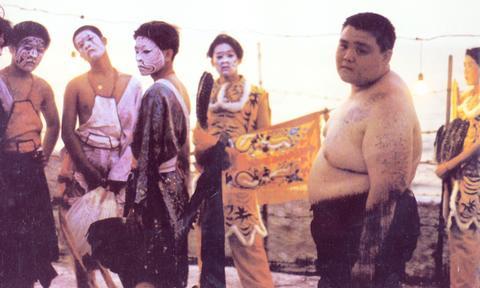Last weekend, on the final day of the eight-day Matsu Pilgrimage from Tachia, the religious event turned nasty. Groups of teenagers, members of various "Eight General" (
The images, broadcast around the country that night, seemed only to confirm the stereotyped image of the youths who make up a high proportion of the Eight General performance groups -- that they are kids gone bad, involved in gangs, sporting tattoos and generally school drop-outs.

PHOTO COURTESY OF CHANG TSO-CHI STUDIOS
Teen movies
"Such fights are a very ordinary occurrence in their culture. But now it's been shown on TV, the whole thing may be amplified," said film director Chang Tso-chi (張作驥), whose film Ah-Chung (忠仔) chronicles the life of such teenagers. His debut film, it picked up Best Supporting Actor in the 1996 Golden Horse and Best Director at Thessaloniki the same year.
"When we were shooting the film, we witnessed many fights. Most of them were not so serious," he said. Chang said the Eight Generals groups had become a particularly Taiwanese phenomenon. "And there is also a strong sense of drama," he said.
In the film Ah-Chung, a leader of an Eight Generals troupe trains his students in the required rituals. Some of this involves self-flagellation with spiked cudgels that soon has the kids covered in blood. Using a spiked cudgel to strike the forehead is usually the climax of an Eight Generals performance.
With the Generals calling out "Kill!" and the crowds chanting "Yao-la-yao-la" (shake, shake), the generals shake their heads and strike themselves with various weapons. Some might even go so far as to pierce their tongues or beat their bodies into a lather of blood and sweat.
"If it got really extreme, some kids would throw sharp knives up in the air and let these knives fall on their heads. Of course, these kids quickly end up in hospital," said Chang.
"Boldness and cruelty are important elements of the Eight Generals culture," Chang said. The key point is the bravery of self-torture. "Hitting other people and making them bleed is not unusual. But the question is, `Do you dare do it to yourself?'"
But, of course, these instruments of self-torture came in handy when they wanted to hit out at others during the Tachia Matsu Pilgrimage.
According to the book The Mighty and Mysterious Street Dancers -- The Eight Generals (
The Eight Generals wear gaudy, embroidered clothing, fierce face-paint and straw sandals. They walk in an exaggerated swagger called "tiger steps" and their performance, traditionally, represented them bringing criminals to justice and protecting the people.
"But in the early 1990s, when I began shooting documentaries about Taiwan's problem teenagers, I saw how the Eight Generals phenomenon was changing," said Chang.
"The self-torture was emphasized. It had become more violent -- something the crowd seemed to like," he said. "A common belief is that the more bloody and violent the performance is, the better the Eight Generals are. It proves they are real gods."
Hellish persona
According to Chang, the Eight Generals became popular as part of any event seeking blessings from the gods. Even when a small business opened, an Eight Generals troupe would be hired to give a performance.
"In fact this goes against custom, because the eight generals are spirits from the nether world [from hell rather than heaven]," he said. But now the Eight Generals are very much part of this world, and also very market oriented.
"I like to go to Tachia's Chenglan Temple to practice the Eight Generals performance. It's a lot of fun. We follow all the different gods as we tour around Taiwan. ... The greatest thing about being part of an Eight Generals group is that you can get red envelopes along the way. We split the money among group members. I became more confident, because as long as I am a member of the Eight Generals, nobody dares bully me," one junior high school student was quoted as saying in a study of Eight Generals teenagers conducted by the National Taiwan Normal University.
"We emphasize honor. Our performance must stand out. And as for fights, we can only win, not lose. We support each other. If one of us is in trouble, all of us will help. None of us is chicken shit. Anyone asks for trouble, only one thing will happen -- death," said a 15-year-old, drop-out quoted in the research.
The violence, the gang spirit, the religious mysticism and the red envelopes, all add to the appeal of the Eight Generals.
"They inhabit a gray area between god and human, between acting and magic. It is also an area between real gangsters and the police," said Chang.
According to Chang's observation, most of Taiwan's thousands of Eight Generals groups belong to minor criminal gangs rather than the major organized crime groups.
It's easy to start a group, said Chang. As long as you have a small temple, or even just a small shrine, you can recruit some teenagers with not much to do," he said.
"The temples may be an unlicensed building and the practice field a parking lot illegally taken over by the group. But no one will complain, or even bother to call the police," said Chang.
The reason. First, because they would say, "I'm of the gods." And second, these gods are violent. Eight Generals groups have been linked to a number of brutal killings of teenagers, but, despite this, Chang cannot help but find this a fascinating teenage phenomenon.
Most of the teenagers Chang used in his film Ah-Chung began their life of crime at 14 or 15. "It is almost impossible for adults to teach them what is right and wrong," he said.
"As drama, it is all interesting and fascinating. But from the point of view of education, it is very difficult," Chang said.

As we live longer, our risk of cognitive impairment is increasing. How can we delay the onset of symptoms? Do we have to give up every indulgence or can small changes make a difference? We asked neurologists for tips on how to keep our brains healthy for life. TAKE CARE OF YOUR HEALTH “All of the sensible things that apply to bodily health apply to brain health,” says Suzanne O’Sullivan, a consultant in neurology at the National Hospital for Neurology and Neurosurgery in London, and the author of The Age of Diagnosis. “When you’re 20, you can get away with absolute

When the South Vietnamese capital of Saigon fell to the North Vietnamese forces 50 years ago this week, it prompted a mass exodus of some 2 million people — hundreds of thousands fleeing perilously on small boats across open water to escape the communist regime. Many ultimately settled in Southern California’s Orange County in an area now known as “Little Saigon,” not far from Marine Corps Base Camp Pendleton, where the first refugees were airlifted upon reaching the US. The diaspora now also has significant populations in Virginia, Texas and Washington state, as well as in countries including France and Australia.

On April 17, Chinese Nationalist Party (KMT) Chairman Eric Chu (朱立倫) launched a bold campaign to revive and revitalize the KMT base by calling for an impromptu rally at the Taipei prosecutor’s offices to protest recent arrests of KMT recall campaigners over allegations of forgery and fraud involving signatures of dead voters. The protest had no time to apply for permits and was illegal, but that played into the sense of opposition grievance at alleged weaponization of the judiciary by the Democratic Progressive Party (DPP) to “annihilate” the opposition parties. Blamed for faltering recall campaigns and faced with a KMT chair

A police station in the historic sailors’ quarter of the Belgian port of Antwerp is surrounded by sex workers’ neon-lit red-light windows. The station in the Villa Tinto complex is a symbol of the push to make sex work safer in Belgium, which boasts some of Europe’s most liberal laws — although there are still widespread abuses and exploitation. Since December, Belgium’s sex workers can access legal protections and labor rights, such as paid leave, like any other profession. They welcome the changes. “I’m not a victim, I chose to work here and I like what I’m doing,” said Kiana, 32, as she